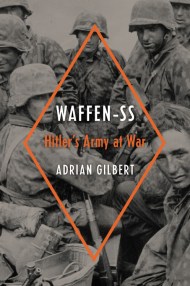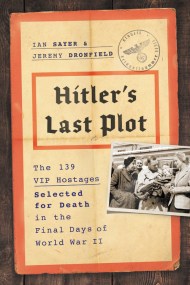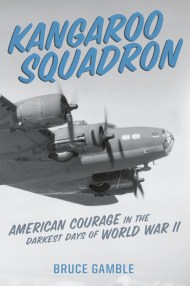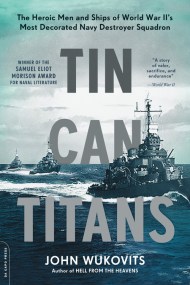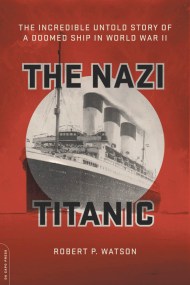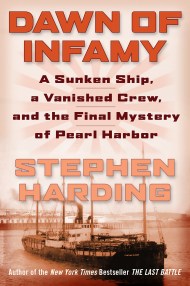Shopping Cart
Desperate Valour
Triumph at Anzio
Description
The four-month-long 1944 battle on Italy’s coast, south of Rome, was one of World War II’s longest and bloodiest battles. Surrounded by Nazi Germany’s most fanatical troops, American and British amphibious forces endured relentless mortar and artillery barrages, aerial bombardments, and human-wave attacks by infantry with panzers. Through it all, despite tremendous casualties, the Yanks and Tommies stood side by side, fighting with, as Winston Churchill said, “desperate valour.”
So intense and heroic was the fighting that British soldiers were awarded two Victoria Crosses, while American soldiers received twenty-six Medals of Honor–ten of them awarded posthumously.
The unprecedented defensive stand ended with the Allies breaking out of their besieged beachhead and finally reaching their goal: Rome. They had truly snatched victory from the jaws of defeat.
Award-winning author and military historian Flint Whitlock uses official records, memoirs, diaries, letters, and interviews with participants to capture the desperate nature of the fighting and create a comprehensive account of the unrelenting slugfest at Anzio.
Desperate Valour is a stirring chronicle of courage beyond measure.
What's Inside
CHAPTER 1
“We have every confidence in you”
JANUARY 1944
IT WAS THE FRIGID PREDAWN of January 22, 1944, and death hung heavily in the air. An armada of 374 British and American ships, landing craft, and an assortment of other vessels, filled with 36,000 nervous, determined men, was roaring hell-bent for the darkened Italian coastline.
In one of the landing craft, a twenty-eight-year-old U.S. Army major from upstate New York named Alvah Miller, commander of the 3rd Battalion of the U.S. Ranger Force, was peering over the gunwale of his landing craft at the darkness ahead in the Anzio-Nettuno harbor. His mind was a jumbled squirrel’s nest of thoughts. When would the Germans open fire? Surely, the Germans couldn’t be asleep, so why was there no artillery or machine-gun fire to greet their arrival? Didn’t the same thing happen to the Rangers just four months earlier when they had landed at Maiori, a fishing village at the base of the Sorrento Peninsula, as part of Operation Avalanche—the invasion of mainland Italy? The Germans let the Rangers come ashore and climb to the top of Chiunzi Pass over the mountain separating Salerno from Naples, and then all hell broke loose. When was hell going to break loose now? Major Alvah Miller didn’t know—nor did he have any idea that he had only one week left to live.
Thirty-year-old Major Peter Henry “Skipper” Mornement, commanding C Company of the 2nd Battalion, North Staffordshire Regiment, was aboard another landing craft, this one heading toward “Peter” Beach in the British sector north of Anzio. He may have given some thought to his mother, wife, and son back in London, but his mind was probably more focused on his company’s mission once they reached land—if they reached land. He did not suspect that he would soon be wounded, taken prisoner, and die in an Italian hospital.
On another landing craft, this one on its way to “X-Ray” Beach, south of Anzio, a fresh-faced nineteen-year-old private first class named John C. Squires of Louisville, Kentucky, a member of the 3rd U.S. Infantry Division, was understandably nervous about going into combat for the first time. Although he gripped his M-1 Garand rifle tightly, he hoped he wouldn’t have to use it because he was his company’s messenger, not a frontline infantryman. He did not believe that he was capable of performing acts so heroic that he would be awarded the Medal of Honor, but he would. Unfortunately, it would be a posthumous award, for he would not live to receive it.
Aboard the command ship USS Biscayne, fifty-four-year-old Major General John Porter Lucas felt as helpless as a spectator at a sporting event. This operation, which had been given the code name Shingle, was his baby, and all these men in all these ships about to hit their respective beaches were his responsibility. “I mustn’t stick my neck out and do anything foolish,” he probably thought, recalling the words of his boss, Lieutenant General Mark Clark, Fifth U.S. Army commander. He knew that Salerno had almost been a disaster; the same thing must not happen here. He would take his time, move cautiously, risk nothing. He could not foresee that his cautious, slow-and-steady performance during this operation would cost him his job, his career, and his reputation.
OPERATION SHINGLE HAD BEEN BORN out of necessity, and although such a maneuver—landing behind German lines—had been discussed since October, it gave the appearance of having been cobbled together at the last minute. The unexpectedly stubborn German resistance along the Gustav Line had dashed all hope of capturing and liberating Rome by the end of 1943, thereby necessitating the end run up the coast. An adequate number of landing craft had to be assembled from all over the Mediterranean, warships formed into a task force, air assets reassigned, units added to VI Corps, sufficient supplies gathered, and a rehearsal scheduled.
Adding to the headaches was the fact that Clark and British Field Marshal Harold Alexander had a contentious working relationship, with the gentlemanly Alexander complaining privately that the egocentric Clark was a vain prima donna who also had a habit of speaking sharply and nastily to him.
Events were moving ahead at a rapid pace—too rapid for Lucas’s taste—and were threatening to spin out of his control. Decisions, too, were being made without his knowledge, advice, or consent. On January 7, 1944, some of his VI Corps staff officers attended (without him) a meeting with Churchill in Marrakech, Morocco, in which Lucas’s officers “maintained that past experiences had shown that a rehearsal was absolutely necessary, but Mr. Churchill argued that all these troops were trained and therefore needed no rehearsal.” What Mr. Churchill failed to appreciate, or was not told, was that not “all” of the troops were trained or combat experienced; a good many of them were raw replacements who had had only minimal training and had not taken part in the previous amphibious landings or the ground combat that followed the invasions of Sicily and Salerno.
Three days later, another conference was held from which Lucas was again inexplicably excluded. Lucas noted, “Apparently Shingle has become the most important operation in the present scheme of things. Sir Harold [Alexander] started the conference by stating that the operation would take place on January 22 [1944] with the troops as scheduled, and that there would be no more discussion of these two points. He quoted Mr. Churchill as saying, ‘It will astonish the world,’ and added, ‘It will certainly frighten Kesselring.’” Lucas had his doubts; the one who was frightened was Lucas.
Because everything about Shingle was being imposed on him and there would be “no more discussion,” Lucas said that he “felt like a lamb being led to the slaughter, but I thought that I was entitled to one last bleat, so I registered a protest against the target date, as it gave me too little time for rehearsal…. I was ruled down, as I knew I would be…. When I said this to General Alexander yesterday, he said, ‘We have every confidence in you; that’s why you were picked.’”
Sir Harold’s verbal pat on the head was reassuring, but Lucas still wasn’t certain what the objective of his mission was. It was clear that his VI Corps was supposed to grab the beachhead and the port of Anzio, push several miles inland, but then what? Make a mad dash for Rome, just forty miles away, and capture the entire city with just a small force? Or was the operation supposed to throw Field Marshal Albert Kesselring, commanding Army Group C, into such a panic that he would pull the Tenth German Army out of the Gustav Line and flee for the Alps?
Or was Lucas merely supposed to hang on to the Anzio beaches and wait for more troops and supplies to arrive so that a proper advance in strength could be mounted that would take the Allied Fifth and Eighth Armies all the way through Rome and to the Alps—and into Austria and ultimately into southern Germany? Seeking clarification, Lucas asked Clark, “Just what the hell am I supposed to do?” Clark replied, “Don’t stick your neck out, Johnny. I did at Salerno and got into trouble. You can forget this goddam Rome business.” Lucas took the comment to be an inviolable order that meant “Don’t be aggressive or do anything foolish.”
This cautionary view was reinforced by Fifth Army operations officer Brigadier General Donald W. Brann, who met with Lucas on January 12, 1944, and told him that his primary task was to seize and secure a beachhead. Clark did not want him galloping off to the Alban Hills and run the risk of the Germans possibly destroying his VI Corps. But—and this was a big but—if he saw an opportunity to capture the Alban Hills, he should take it. The most important thing, however, was to establish and hold a beachhead.4 It was no wonder that Lucas confided to his diary on January 10, “This whole affair had a strong odor of Gallipoliand apparently the same amateur was still on the coach’s bench.”
PRIOR TO LAUNCHING SHINGLE, A major push by Fifth Army against the western end of the Gustav Line was set in motion in order to keep the German forces pinned there. The American operation kicked off on January 15, 1944, but immediately came up short, with the 36th U.S. Infantry Division suffering horrendous casualties trying to cross the Rapido River.
On the same day that the offensive began, the voluminous Fifth Army order for Operation Shingle was published, and Lucas was anything but pleased. “Instead of advancing to seize Colli Laziali [another name for the Alban Hills],” he wrote, “I was to ‘advance on’ that terrain feature, and no mention of Rome was made whatsoever.” Don Brann had already made it clear three days earlier that “my primary mission was to seize and secure a beachhead.” Lucas understood that he was not to “push on at the risk of sacrificing my Corps. Should conditions warrant, however, I was free to move to and seize Colli Laziali.” A more ambiguous order has probably never been issued.
ON JANUARY 18, VI CORPS held a full-scale dress rehearsal for Shingle—a rehearsal that confirmed Murphy’s Law: “Anything that can go wrong will go wrong.” Although the British rehearsal, conducted by the Royal Navy about six miles south of Salerno, went off with only a few minor hitches, the practice landings of Lucian Truscott’s 3rd Infantry Division at the same place—code-named Operation Webfoot—were a disaster.7 Truscott noted:
[The battalions] had been disembarked so far at sea that few had landed on their proper beaches, and all had landed late. No artillery, tanks, or tank destroyers [TDs] were yet on shore at 0800 [8:00 A.M.], although all should have been ashore by daylight with the infantry battalions. Then in fragments came the appalling news. Through some error in navigation, the transport area had been many miles farther from the shore than it should have been. In darkness, the LSTs [Landing Ship, Tank—sometimes mordantly called a “large, slow target”] had opened their doors, lowered their ramps, discharged the DUKWs* which carried the artillery into rough seas, where twenty or more had swamped and sunk. Incomplete reports indicated that the artillery pieces and communication equipment of perhaps two battalions had been dumped into the sea…. Beaches were in a chaotic condition, and the whole landing plan was completely disrupted.
Forty-three of the amphibious vehicles were lost during the debacle, which was blamed squarely on the navy. Also lost were nineteen 105mm howitzers and nine antitank guns—guns that had to be taken from divisions scheduled to come in later. Peter Geoffrey Bate, a driver for a British artillery unit landing nearby, recalled that he saw “about thirty DUKWs go straight to the bottom.”
Truscott requested from Clark permission to conduct a second rehearsal in hopes of correcting the errors, but Clark shook his head. “Lucian, I’ve got your report here and it’s bad. But you won’t get another rehearsal. The date has been set at the very highest level. There is no possibility of delaying it even for a day. You have got to do it.” Truscott protested that he wasn’t requesting that Shingle be delayed—only that another rehearsal be scheduled. No dice. Disastrous rehearsal or not, one was all that the 3rd Division and VI Corps were going to get.
Lucas, too, was beyond upset at the fouled-up rehearsal. “Everything went wrong,” he complained in his diary. The 3rd Division’s part was the worst—“the most mixed-up affair I have ever seen…. Not a single unit landed on the proper beach, not a single unit landed in the proper order, not a single unit was less than an hour and a half late.”
It was true. The U.S. Navy’s VIII Amphibious Force, under the command of Rear Admiral Frank Lowry, had released the DUKWs too far from shore and dropped infantry units at the wrong places, in the wrong order, and at the wrong times. An officer in the 3rd Division called the rehearsal “a complete fiasco.”13 Clark was also furious at the navy, claiming that “overwhelming mismanagement by the Navy” had resulted in the foul-ups and loss of equipment that Fifth Army would be hard-pressed to replace. Admiral Lowry, red-faced and thoroughly chastised by Clark, reacted by lambasting the ships’ commanders, telling them the actual landings had better be letter perfect. Any ship not within three and a half miles of Anzio at H-hour on the D-day* morning of January 22, he warned them, would get “a kick in a soft spot by a cruiser.”
In the world of the theater, it is said that if the dress rehearsal goes badly, opening night is destined to go perfectly. The planners and participants of Operation Shingle fervently hoped that the hoary maxim would hold true for a military operation as well.
Patton was no help. He flew from Sicily to visit his friend Lucas in Naples and tell him good-bye. “He seemed much disturbed and preoccupied,” Lucas wrote, “but finally blurted out, ‘John, there is no one in the Army I hate to see killed as much as you, but you can’t get out of this alive. Of course, you might be only badly wounded. No one ever blames a wounded general for anything.’ The following morning, he buttonholed one of my aides… and told him ‘Look here, if things get too bad, shoot the old man in the “back end,” but don’t you dare kill the old bastard.’”
The rehearsals were now, for better or for worse, finished, and there was no use crying over spilled howitzers and drowned DUKWs; it was now time for the real thing.
ALBERT KONRAD KESSELRING, HEAD OF German forces in Italy, was an old hand at war and did not frighten easily. Born the son of a schoolteacher on November 30, 1885, in Marksteft, Bavaria, he began his military career in 1904 as an officer cadet and was posted to an artillery regiment. When the Great War broke out, he was transferred to the German Air Service and trained as a balloon observer. In 1921, at the age of thirty-six, he obtained his pilot’s license and was eventually promoted to major general in the reconstituted Luftwaffe. In 1939, as commander of the First Air Fleet, Kesselring had his aviators provide air support for the invasion of Poland. The following year he was transferred to head up the Second Air Fleet during the German invasions of France, Holland, and Belgium. His pilots also attacked British and Allied troops trying to escape to Britain from Dunkirk. During the battle of Britain in the summer and fall of 1940, his Second Air Fleet bombed London and the next summer supported Operation Barbarossa, the German invasion of the Soviet Union.
Kesselring was then transferred to North Africa to become commander of all air and ground forces in the Mediterranean area. After the Allies had beaten the Germans and Italians, secured North Africa, and then taken Sicily in the summer of 1943, Kesselring and his troops nearly destroyed Mark Clark’s attempts to gain a foothold at Salerno during Operation Avalanche. At this time, he was subordinate to Field Marshal Erwin Rommel, the famed “Desert Fox,” who had managed to hold North Africa against the Allies longer than anyone could have foreseen. When, in November 1943, Hitler ordered Rommel transferred to France to take charge of improving the German “Atlantic Wall” defenses there in order to stop the Allies’ expected cross-Channel invasion, the Führer installed Kesselring, a wily fox in his own right, as commander of the German army in Italy—Army Group C.
Because of the increased Allied activity around the Garigliano River in early and mid-January 1944, Kesselring sensed that the Allies were about to spring something big; his spies in Naples and Pozzuoli confirmed it when they spotted Allied troops and landing craft being brought into the port cities. “On the three nights preceding the [Anzio] landing,” Kesselring later wrote, “I had ordered an emergency alert throughout the whole of Italy."
Kesselring had read the tea leaves correctly. To keep Colonel General Heinrich von Vietinghoff’s Tenth Army units pinned down all along the Gustav Line, Clark, beginning on January 12, had launched strong ground, air, and naval attacks against the line that would, with any luck, propel Major General Geoffrey Keyes’s II U.S. Corps through the German defenses and into the Liri Valley, where it might push quickly northward and link up with Lucas’s VI Corps driving inland from the Anzio beachhead. Clark had already told Alexander on January 2 that “I intend to attack in greatest possible strength in [the] Liri Valley several days in advance of Shingle with the object of drawing maximum number of enemy reserves to that front and fixing them there. In that way and that way only can the Shingle force exercise a decisive influence in the operation to capture Rome.”
At least that was the plan. The reality would be something altogether different.
BACK IN THE NAPLES PORT of Pozzuoli, the armada was getting ready to depart for Anzio. George Avery (Company B, 84th Chemical Mortar Battalion) said that his battalion was attached to the 3rd Infantry Division, “and that fact alone let us know that wherever we were going it would not be pleasant. The 3rd were veterans of North Africa, Sicily and Salerno and had been involved in every major engagement.”
Truscott’s 3rd Division was scheduled to hit its assigned beach at 2:00 A.M. on January 22 with three battalions abreast, supported by a 105mm self-propelled field artillery battalion, a battery of 155mm guns, a medium tank battalion, a tank-destroyer battalion, an antiaircraft automatic weapons battalion, and the 84th Chemical Mortar Battalion that could fire either smoke or high-explosive shells. Added to this force to take the towns of Anzio and Nettuno were the 504th Parachute Infantry Regiment and the American Ranger Force.
Avery was trucked from the battalion’s staging area in Pozzuoli, where the unit headed directly to the docks, and he saw a massive group of ships was gathered at the piers as well as anchored offshore. Ships dockside were being loaded at a steady rate and it was apparent that we were some of the last to arrive. We were driven to an LST and immediately boarded. Dozens of little kids were at dockside chanting “Anzio,” “Anzio, Joe,” and begging for cigarettes and candy. Adults were roaming the docks selling oranges, walnuts, “cherry brandy” and “cognac.” Old women were begging for food with outstretched arms.
A troop transport direct from New York was moored close to us, and had been there for days. These troops were going unassigned to Anzio, having not yet set foot on Italian soil, and were destined to supply the replacement depots—“repple depple” in infantry talk. Our hearts went out to them. And, for the very first time, we crossed paths with the 83rd Chemical Mortar Battalion. It had joined the war somewhere in Sicily, but had skipped action in Italy for reasons unknown, and was being loaded aboard a LST of its own.
Avery continued:
Aboard ship we were invited to make ourselves at home…. Having no sleeping quarters, we were fed hot Navy food on deck in mess gear with unlimited coffee served in galvanized cans heated over gas burners and left on deck all night. I have never forgotten that thoughtfulness. I chose to sleep under a truck carrying who-knows-what on the open deck. We were issued bandoliers of rifle ammo, hand grenades, and three chocolate bars. Now we really knew. These chocolate bars were given to us almost always when there was to be a prolonged battle and food might be short. The chocolate is as hard as a rock, has to be cut to be eaten, never melts, can be carried in your pocket for days and substituted for food.*
“The following dawn the entire convoy… set sail in a calm sea, on a beautiful, cloudless, sunny day,” said Avery. “None of us knew where our destination (Anzio) was. Toward late afternoon there was friendly air traffic high above us that every once in a while made its appearance until night fell. Late that night, the sergeants were called by our officers and returned with maps and instructions.” The grand effort to surprise the Germans at Anzio and perhaps break their firm grip on Italy had begun.
On D-day eve, January 21, Major General John Lucas began to feel a bit more positive. The weather was predicted to remain good, and there were no signs that the Germans suspected anything. “I think we have a good chance to make a killing,” he noted, but he could not shake the feeling that disaster lurked in his future. “I have many misgivings but I am also optimistic.” He was then overcome with gloom:
I struggle to be calm and collected…. I wish the higher levels were not so over-optimistic. The Fifth Army is attacking violently towards the Cassino Line and has sucked many German troops to the southand the high command seems to think they will stay there. I don’t see why. They can still slow us up there and move against me at the same time…. The strain of a thing like this is a terrible burden. Who the hell wants to be a general?

